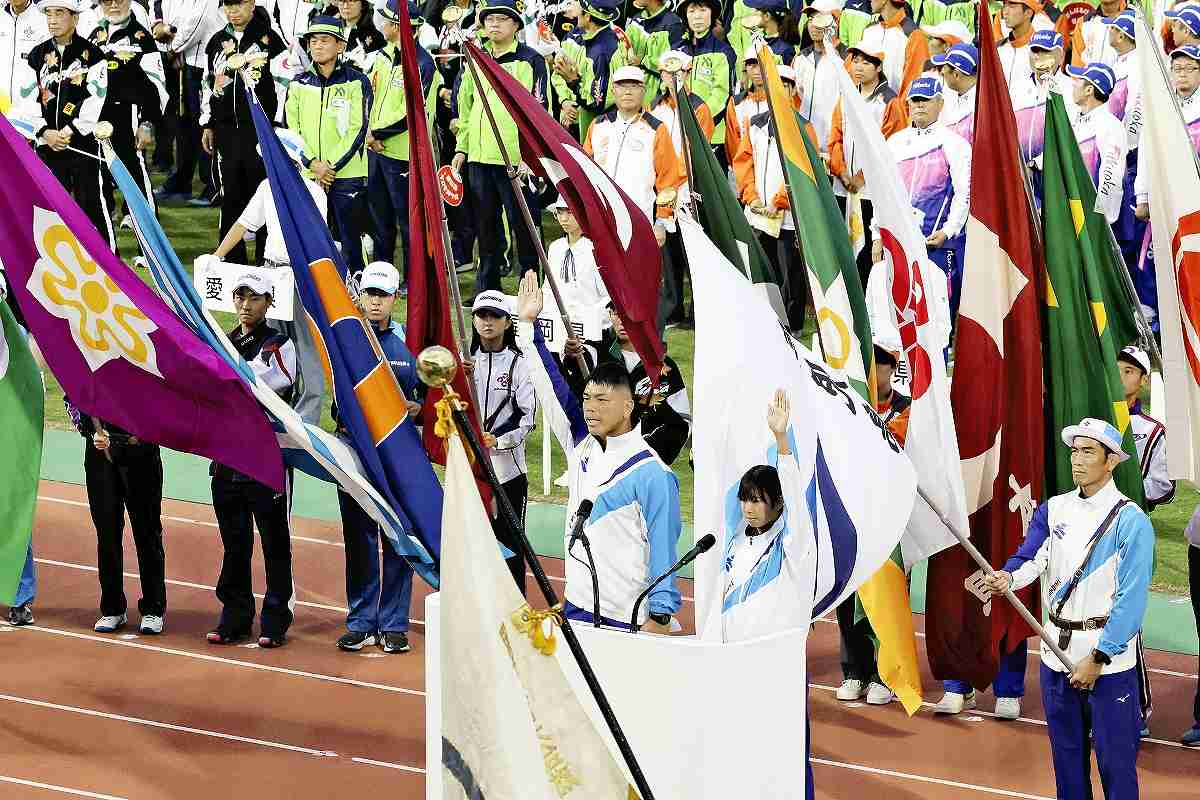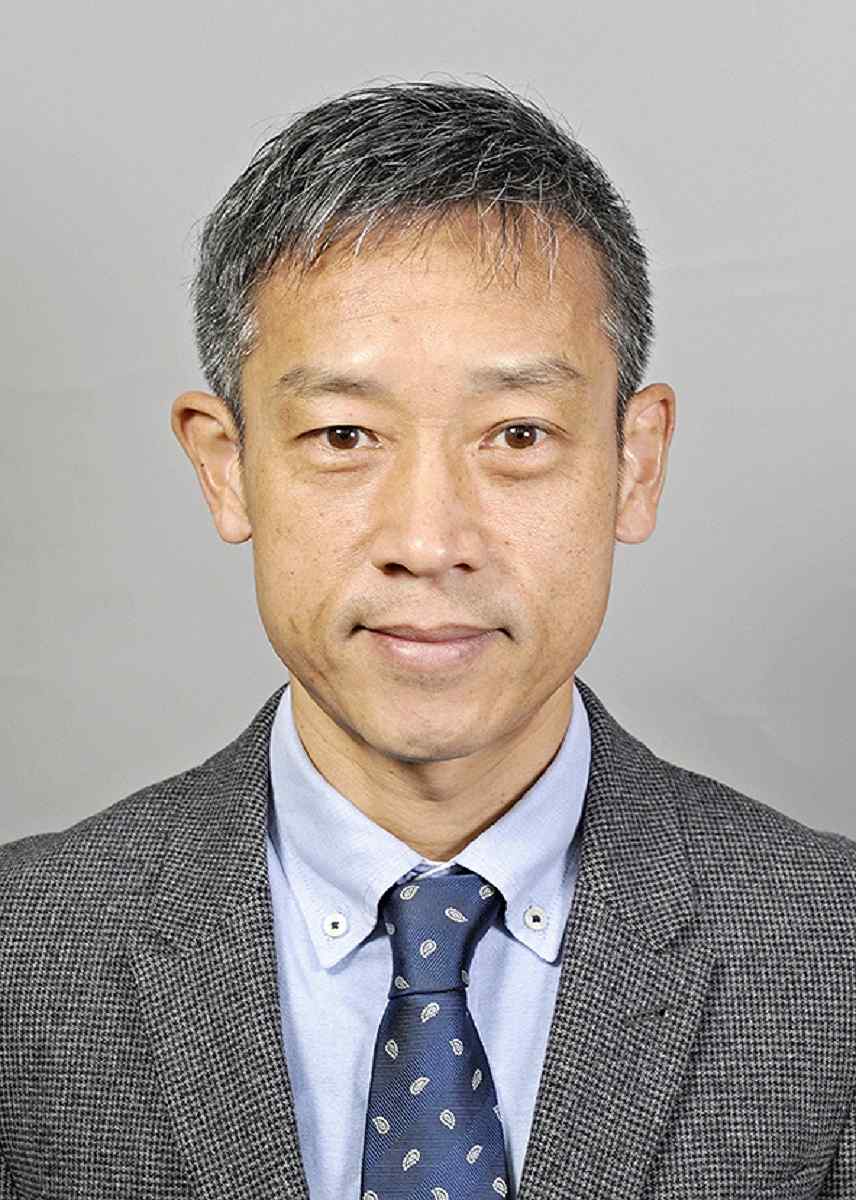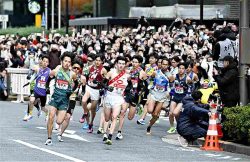
Two competitors take athletes’ oath at the opening ceremony of the 2023 National Sports Festival.
8:00 JST, June 22, 2024
The Japan Games, an annual multisport event hosted by each prefecture on a rotating basis, is at a major crossroads. Its organizer, the Japan Sports Association (JSPO), decided on June 5 to establish an expert panel to discuss fundamental reforms of the Games. The talks will focus on how to reduce the burden on the host municipalities, something that has long been considered a problem.
The National Sports Festival, predecessor of the Japan Games, began in 1946 and has been held nearly every year since then, with a total of 27,000 participants in 40 sports at the main autumn Games and the winter Games. The venue for the autumn Games rotates among the 47 prefectures, with the 2034 Okinawa Games marking the end of the second round of hosting.
The National Sports Festival was called Kokumin Taiiku Taikai in Japanese, which was popularly abbreviated to Koku-Tai. But the Japanese name did not include the word “sports.” Taiiku means physical education, and there was still a hint of an educational aspect to the event, as it nurtured individuals who possessed the right combination of spirit, skill and physical prowess.
However, as the times changed and people’s values changed as well, “Taiiku” was replaced with the word “sports”— which is commonly used worldwide — to share the pure value of sports with people around the world. Starting this year, the Japanese name was changed to Kokumin Sports Taikai and the abbreviation to Koku-Supo. The English name was changed to the Japan Games.
Launched during the postwar reconstruction period, the Japan Games has rotated among the 47 prefectures, thereby promoting the development of sports facilities throughout the country. As a result, it contributed greatly to the spread and promotion of sports and the improvement of athletic performance in Japan.
The Japan Games has also played a role in the development of infrastructure related to local life and industry, such as the construction of “Koku-Tai Roads” to coincide with the Games.
However, as the prefectures began their second round of hosting, some of the facilities needed renovations due to aging, while other hosts had to build new facilities. Host municipalities began to complain about the increased financial and operational burden.
The problem came to light in the 1990s, and in 2003, the JSPO formulated the Games Reform plan, which focused on simplifying operations. Based on this plan, the JSPO decided to unify the summer and fall events in 2006 and to reduce the number of participants by 15% in 2008.
However, even with these changes, they were unable to change the fact that local governments felt hosting the gathering was a burden.
Apparently frustrated with the situation, Miyagi Gov. Yoshihiro Murai, chairman of the National Governors’ Association (NGA), criticized the event. At a regular press conference in April of this year, Murai said the Japan Games was a heavy financial burden on the prefectural governments.
“Abolishing the Games is one measure to consider. We need to stop and think about whether the current way is the right way,” Murai said.
His stern statement drew support from all over the country.
Osaka Gov. Hirofumi Yoshimura said, “It would be better if the Japan Games was held once every few years, with cooperation from the regional blocs.” Fukuoka Gov. Seitaro Hattori said, “The Games has played a significant role in promoting health and infrastructure development, but we should consider reducing the size of the opening ceremony and the number of sports involved.”
Although there is dissatisfaction among local governments, it is also true that hosting the Games brings benefits to a region. Tochigi Prefecture, which hosted the winter Games and the main autumn Games in 2022, spent ¥82.8 billion in total, including the National Sports Festival for People with a Disability, but also saw an economic ripple effect of ¥118.3 billion. For this reason, not all governors are in favor of abolishing the Games.
Gov. Norihisa Satake of Akita Prefecture said, “It will certainly be a burden, but it will motivate the athletes. We should carefully discuss the issue.” According to Gov. Mieko Yoshimura of Yamagata Prefecture: “The Japan Games should be held as a sustainable event. It is necessary to consider who should bear the burden, including the national government and the JSPO.”
The expert panel was established in response to the seriousness of the governors’ concerns. It will discuss fundamental reforms for 2035 on, when the third cycle of hosting is set begin. The panel will consist of 20 to 30 members, including representatives of local governments, sports organizations, and former athletes.
The NGA, which has called for a review of the Japan Games, will also be asked to participate in the talks. A corporate executive who is familiar with economic ripple effects and regional revitalization is being considered as a candidate for the panel’s chair.
“It’s natural that some people think the Japan Games should be abolished,” Toshiaki Endo, former Olympics minister and chairman of the JSPO, said at a press conference on June 5. “Personally, I think they’ve had a very positive effect,” he added, expressing his hope to continue the Games in the future.
In response to this move by the JSPO, Murai said, “The NGA will also consider the matter so that the Games can be made sustainable. We won’t consider abolishing the Japan Games.”
Katsuhiko Yokoyama, a professor of sports policy at Doshisha University, said, “The JSPO will not gain understanding unless it reevaluates the Japan Games in accordance with the historical background and the financial situation of local governments, and shows the value of a new Japan Games.”
With 10 years remaining until the end of the second round of hosting, the JSPO sees this as the last chance for reform. How can the JSPO reduce the financial burden on local governments and devise sustainable ways to host the event? A conclusion that can be agreed upon by the entire nation must be reached through discussions in which nothing is off-limits.
Political Pulse appears every Saturday.

Yuji Kondo
Yuji Kondo is a senior writer in the Sports Department of The Yomiuri Shimbun.
Top Articles in Editorial & Columns
-

Riku-Ryu Pair Wins Gold Medal: Their Strong Bond Leads to Major Comeback Victory
-

China Provoked Takaichi into Risky Move of Dissolving House of Representatives, But It’s a Gamble She Just Might Win
-

University of Tokyo Professor Arrested: Serious Lack of Ethical Sense, Failure of Institutional Governance
-

Policy Measures on Foreign Nationals: How Should Stricter Regulations and Coexistence Be Balanced?
-

Japan’s Plan for Investment in U.S.: Aim for Mutual Development by Ensuring Profitability
JN ACCESS RANKING
-

Japan PM Takaichi’s Cabinet Resigns en Masse
-

Japan Institute to Use Domestic Commercial Optical Lattice Clock to Set Japan Standard Time
-

Israeli Ambassador to Japan Speaks about Japan’s Role in the Reconstruction of Gaza
-

Man Infected with Measles Reportedly Dined at Restaurant in Tokyo Station
-

Videos Plagiarized, Reposted with False Subtitles Claiming ‘Ryukyu Belongs to China’; Anti-China False Information Also Posted in Japan























